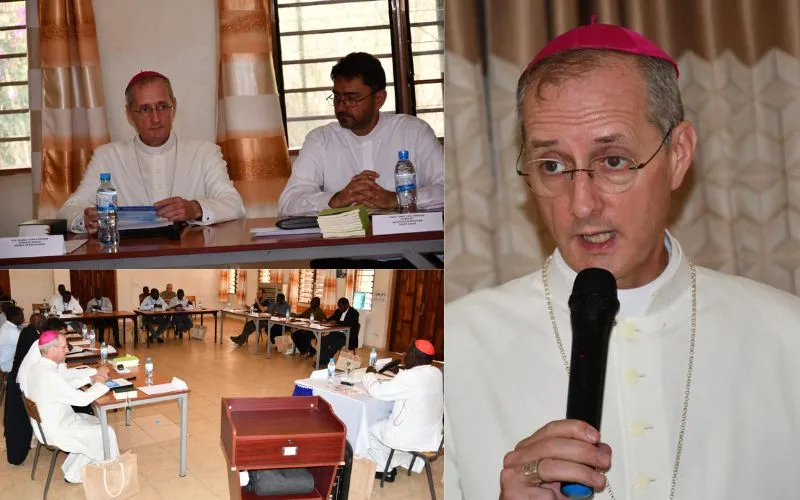Though the authorities in Algeria allow the Church a good deal of freedom, there are restrictions, the former military man explains.
“We are not allowed to say Mass outside the churches and chapels which are recognized as such. We can't go into a university with the Christian students and say mass there; it's not authorized,” he says and adds, “But we have plenty of churches generally where we are. There's always a place of worship for us. And so, we make the most of that.”
Then there are migrants, who the Bishop says endure harsh conditions as they travel through from the South, through the Sahara Desert, before they make their way into Algeria.
“Everybody hears about the Mediterranean as the graveyard of the migrants that so many or so sadly drowned, trying to cross the Mediterranean to Europe. But in fact, even more probably lose their lives crossing the Sahara, coming into Algeria from the south, especially to the bordering countries,” Bishop MacWilliams says.
The migrants coming from Mali, Burkina Faso, Libya and from other countries in West Africa travel to Algeria to work and to beg.
(Story continues below)
They try to get to Europe through Algeria and Morocco.
“It’s a very harsh life and we try to discourage them,” says the 71-year-old Prelate, adding, “I try to encourage my brother Bishops from the countries where they come from to tell them (migrants) not to set off because very, very few succeed and so many lose their lives. Some of them in countries like Libya at the moment become slaves.”
According to the Missionary of Africa Prelate who has been ministering as Bishop in the North African country since May 2017, many of the migrants find themselves in prison for crimes they have not committed.
Additionally, the society in North Africa is not always very welcoming to people from sub-Saharan Africa.
“There is a certain racism among some elements of the society as a whole. And that can sometimes be an added difficulty for our mission coming from Africa,” he says, adding that there are about 100 prisoners spread in different prisons within the Diocese of Laghouat.
He adds, “They (migrants) tend to avoid the authorities because they might be asked for their papers and be arrested and deported and they don't want to be deported from the country. It is a bit difficult when we organize reunions or diocesan assembly every year. They can't come because they haven't got papers to travel.”
Hinting on the challenge of finding a spouse in Algeria where Christians are few and scattered, the Catholic minister says, “Marriage is a big challenge as finding somebody of your religion is a huge task when you are just one or two in the country.”
Additionally, Clerics in the North-African countries, according to the Bishop, have no authority to speak on issues affecting the society since Christians are a minority group.
“Where the Church is established, it becomes part of the society. So the Church in a country like Kenya or in the Democratic Republic of Congo is in a position to actually speak out on public matters, on matters of ethics, even political matters and matters of justice and peace, ecology,” he says, adding, “In North Africa, it's not for us to speak out concerning such issues.”
“We have to keep quiet. We are very vulnerable. If we speak out as foreigners, well, they will simply ask us to leave the country and they have the Church with no pastors, which is not something we want, "Bishop McWilliams who ordained a priest in July 1992 says and adds, "So sometimes we are accused of being too quiet, too cautious, too prudent.”
Further explaining the coexistence between Muslims and Christians, Bishop MacWilliams says, “I've known African migrants being helped by Algerian Muslims. If they're hungry, they would be helped. And I've seen migrants in the hospitals who have been injured or wounded. They were helped by Muslims.”
The Missionary of Africa since his profession in December 1991 adds, “I never heard of any attempt by any of our missionaries to try to convert or turn the children away from their religion. They are Muslims. Conversion is simply helping them to live their lives well in the religion and in their beliefs, whatever it is, the Muslim children remain Muslims. And there's never been any accusation that I've known that the fathers or the sisters who have been there for 150 years have tried to turn the children into Christians.”
Commenting on countries experiencing religious tensions, Bishop MacWilliams says, “I think the ones who attack other people are misguided. They don't even know what their own religion is, really. They have a wrong version. And I think we should welcome them into our hearts.”
He adds, “Instead of splitting into two camps and saying it's us and them, I think we need to say it's all of us together trying to hold hands with each other and be brothers and sisters. And you can't repay hatred with hatred. If you're a Christian, you can only return hatred with love. And that's one of the joys of Christ's life in us that we can share with them."
While other regional Bishops’ conferences in Africa have dozens of dioceses (AMECEA with 122 dioceses spread across eight conferences in nine countries, RECOWA with 154 dioceses spread across 11 conferences in 16 countries), the region of CERNA has only nine dioceses spread across the four countries – two dioceses in Morocco, one diocese in Tunisia, two dioceses in Libya, and four dioceses in Algeria. The four countries are shepherded by seven Bishops, with two dioceses being vacant.
This story was first published by ACI Africa on 12 March 2020








